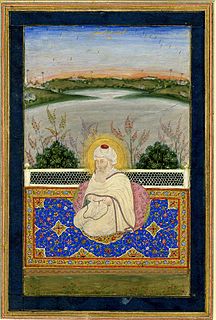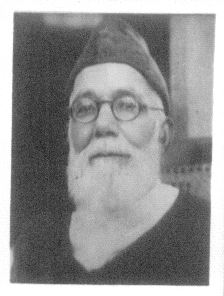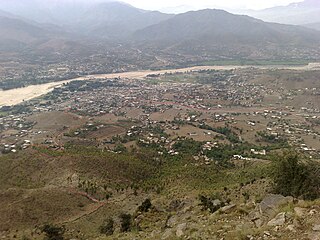Muhammad Sherin(Pashto:محمد شیرین) ;known as Marghuzar Babajee, is a Muslim Sufi(pir), saint and Islamic scholar of Qadiriyya Chishti Silsila (order).

Marghuzar, or Marghazar is a hill station located in the Swat District of the Khyber Pakhtunkhwa province of Pakistan, and is 13 kilometers away from Saidu Sharif. Marghuzar, translated as "green land", contains green valleys, cold springs, and mountains, including the Elum Ghar mountain. In 1940, the then Wali of Swat, Miangul Abdul Wadud, decided to build a summer residence there for himself which became the summer capital of Swat. The palace was named Sufed Mahal, translated as The White Palace. The palace has since been converted into a hotel. Marghuzar has a 200-year-old colossal chinar tree, which serves as a canopy for visitors. There is also a middle school and one primary school for boys and girls each, but there aren't any hospitals or clinics.

Pir or Peer is a title for a Sufi master or spiritual guide. They are also referred to as a Hazrat or Shaikh, which is Arabic for Old Man. The title is often translated into English as "saint" and could be interpreted as "Elder". In Sufism a Pir's role is to guide and instruct his disciples on the Sufi path. This is often done by general lessons and individual guidance. Other words that refer to a Pir include, Murshid, Sheikh and Sarkar. In Alevism, Pir's are considered a direct descendant of Ali.

The Qadiriyya are members of the Qadiri tariqa. The tariqa got its name from Abdul Qadir Gilani, who was from Gilan. The order relies strongly upon adherence to the fundamentals of Islam.
He was born in 1933 in Talash, Dir state to Ghulam Muhammad. His grandfather; Hasan Khan was the disciple of Akhund of Swat. He is father of two daughters. He remained the disciple of Abdul Hadi (Shah Mansur), Maulana Khan Bahadar (Martung babajee), Maulana Sirajul Yum (Gharai Babajee), Maulana Zardad babajee (Mingora) and Maulana Rahimullah (Mingora). [1]

Dir is a region in northwestern Pakistan, in the Khyber Pakhtunkhwa. It is located in the foothills of the Himalayas. Before Pakistan was created, Dir was a princely state, and it remained so until 1969 when it was abolished by a presidential declaration, with the Dir District being created the following year. Dir District was 5,280 square kilometres in area and lay along the disputed border controlled by the Afghan nationalists. The region is situated between Chitral and Peshawar. In 1996 the district was split into Lower Dir and Upper Dir.

Shah Mansur, also named Shah Mansoor or Shahmansoor, is a town and Union Council of Swabi District in Khyber-Pakhtunkhwa province of Pakistan. It is located at 34°4'0N 72°27'0E with an altitude of 301 metres (990 feet).

Mingora is a commercial city in the Swat District of Khyber Pakhtunkhwa, Pakistan, located at an altitude of 984 metres (3,228 ft), 2 km (1.2 mi) away from the town of Saidu Sharif. Mingora is the largest city in Malakand Division, and also the largest in the northern part of Khyber Pakhtunkhwa. Mingora is a major tourist destination, with a large number of hotels.
Muhanmmad Sherin used to stay in a cave near the town Marghuzar known as the cave of Akhund of Swat (A cave where Saidu Baba used to stay and pray), for nearly 17 years. He is now settled in a mosque near Marghuzar where a large numbers of his disciples visit him and receive spiritual education.

Akhūnd Abdul Ghaffūr, commonly known as Saidū Bābā or the Akhund of Swat, was a prominent religious Mullah or priest, and Emir of the former Yusufzai State of Swat. Saidu Baba was a supporter of the Afghan Emir Dost Mohammad Barakzai, and opposed the Sikh and British forces.
Muhammad Sherin performed Hajj (Pilgrimage) four times and few Umrahs. [1] Before sitting in a Chillah he used to work as labour in the construction roads in Swat. He visited India with his brothers to earn their livelihood. He also visited Afghanistan in 1997 where he called on religious scholars. He also visited the tomb of Tamim Ansari and Jubair.

The Hajj is an annual Islamic pilgrimage to Mecca, Saudi Arabia, the holiest city for Muslims, and a mandatory religious duty for Muslims that must be carried out at least once in their lifetime by all adult Muslims who are physically and financially capable of undertaking the journey, and can support their family during their absence. Literally speaking, Hajj means heading to a place for the sake of visiting. In Islamic terminology, Hajj is a pilgrimage made to Kaaba, the ‘House of God’, in the sacred city of Mecca in Saudi Arabia. The rites of Hajj, which according to Islam go back to the time of Prophet Abraham who re-built Kaaba after it had been first built by Prophet Adam, are performed over five or six days, beginning on the eighth and ending on the thirteenth day of Dhu al-Hijjah, the last month of the Islamic calendar. It is one of the five pillars of Islam, alongside Shahadah, Salat, Zakat and Sawm. The Hajj is the second largest annual gathering of Muslims in the world, after the Arba'een Pilgrimage in Karbala, Iraq. The state of being physically and financially capable of performing the Hajj is called istita'ah, and a Muslim who fulfils this condition is called a mustati. The Hajj is a demonstration of the solidarity of the Muslim people, and their submission to God (Allah). The word Hajj means "to attend a journey", which connotes both the outward act of a journey and the inward act of intentions.

The ʿUmrah is an Islamic pilgrimage to Mecca, Hijaz, Saudi Arabia, performed by Muslims that can be undertaken at any time of the year, in contrast to the Ḥajj which has specific dates according to the Islamic lunar calendar. In Arabic, ‘Umrah means "to visit a populated place." In the Sharia, Umrah means to perform Tawaf round the Ka‘bah, and Sa'i between Safa and Marwah, both after assuming Ihram. Ihram must be observed once traveling by land and passing a Miqat like Zu 'l-Hulafa, Juhfa, Qarnu 'l-Manāzil, Yalamlam, Zāt-i-'Irq, Ibrahīm Mursīa, or a place in al-Hill. Different conditions exist for air travelers, who must observe Ihram once entering a specific perimeter about the city of Mecca. It is sometimes called the 'minor pilgrimage' or 'lesser pilgrimage', the Hajj being the 'major' pilgrimage which is compulsory for every Muslim who can afford it. The Umrah is not compulsory but highly recommended.

India, also known as the Republic of India, is a country in South Asia. It is the seventh largest country by area and with more than 1.3 billion people, it is the second most populous country as well as the most populous democracy in the world. Bounded by the Indian Ocean on the south, the Arabian Sea on the southwest, and the Bay of Bengal on the southeast, it shares land borders with Pakistan to the west; China, Nepal, and Bhutan to the northeast; and Bangladesh and Myanmar to the east. In the Indian Ocean, India is in the vicinity of Sri Lanka and the Maldives, while its Andaman and Nicobar Islands share a maritime border with Thailand and Indonesia.











